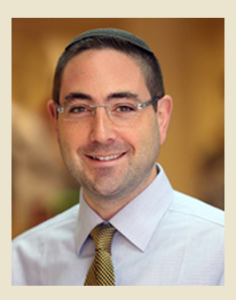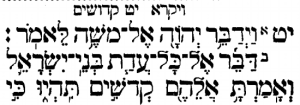
By Rabbi Ari Enkin
This week’s Torah portion is Kedoshim, which essentially means: You shall be holy. What does this mean?
As the first verse of Kedoshim says: “You shall be holy, for I the Lord your God am holy…You shall sanctify yourselves, and you shall be holy, for I am the Lord your God.” [See verses 19:2 and 20:7].
In addition to the commandment to sanctify oneself, this week’s reading – Kedoshim – is a non-stop slew of mitzvot (commandments) to assist in this goal: honoring parents (yup, that one is back again!), keeping the Sabbath (that one also makes a comeback this week), distancing oneself from idolatry, being kind to the deaf and blind, agricultural laws, paying workers on time and a whole lot more.
Indeed, there is a clear message: “You shall be holy” – but holiness doesn’t come so easily! We have to work on it, and this week’s Torah reading is the recipe for doing so through the many mitzvot.
Kedoshim: At Least We Should Try!
The Torah is telling us that we must study and perform, and with that we can achieve holiness. We are not expected to be perfect, but we are commanded to try. For example, even the person who specifically tries not to gossip will occasionally stumble. Nevertheless, he or she is likely to stumble less than one who does not even try! And so it is with every mitzvah – nobody is perfect, but when we work hard on ourselves, we can certainly improve! Even the study of the mitzvot is a fulfillment of “Sanctify yourselves” and “You shall be holy.”
The commentators ask why the commandments to be holy conclude with the words: “I am the Lord your God.” Of course we know that the Lord is God. Why are these verses different from all other verses? Why is it specifically here that we are being reminded that the Lord is God?
It is explained that this is in order to remind ourselves that only God is completely holy and perfect. We will never be exactly like God, but we were created in His image and with many of His character traits and attributes.
We live in both the material and the physical world, and therefore we have our own unique challenges. But we can also use the physical world to achieve certain levels of holiness. With Passover just passed, we need not look back too far to realize how we can actually sanctify the material and physical world. The matza, the meat, the wine, the Passover Seder, the holiday meals – just take a look at how we can use the material and physical – food, for example — in order to get closer to God! We do not believe in ascetism. We believe in using the material and physical to achieve holiness.
I am reminded of a story regarding the great Talmudic sage Hillel. There was once a man who wagered a large sum of money with his friend that he could get Hillel angry. Hillel was already renowned as the most soft-spoken, gentle and kind among men of his generation.
One day, on the eve of Yom Kippur, this troublemaker stood outside the bathhouse waiting for Hillel to emerge. While waiting, he would disrespectfully shout, “Who here is Hillel?” and “Where is Hillel?” When Hillel finally appeared, the man asked him a silly question. Hillel answered with great patience.
The same thing happened again and again, with Hillel being repeatedly called out of the bathhouse only to be asked an irrelevant question. Hillel always answered gently and patiently and treated the man as if he and his question were the most important things in the world.

Hebrew text of the first verse of “Kedoshim,” this week’s Torah Portion. (parsha.blogspot.com)
The man then confessed that this was somewhat of a “set-up” and that he had lost a great sum of money for failing to anger the great sage. Hillel responded that it was better to lose fortunes of money than to become angry!
Kedoshim. Holiness. The Torah and the mitzvot can truly change a person for the better. We just have to let it happen!
Author: Rabbi Ari Enkin, Rabbinic Director, United with Israel

